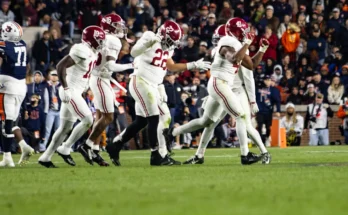**“FIRED FOR CAUSE: Clemson Gymnastics Coach Amy Smith Dismissed Amid Allegations of Verbal and Mental Abuse, Cited for Failing ‘Responsible Treatment’ of Athletes”**
The recent firing of Clemson gymnastics coach Amy Smith has sent shockwaves through the college athletics community, not only because of the abruptness of the decision but also due to the serious nature of the allegations that surfaced shortly afterward. According to a report by The Post and Courier, Smith was terminated “for cause,” with the language in her termination letter directly citing contract sections that relate to the “responsible treatment” of athletes. This phrase, while somewhat clinical on its own, gains significant weight when viewed in the context of follow-up emails from concerned parents to athletic director Graham Neff, referencing alleged “verbal and mental abuse” experienced by student-athletes under Smith’s leadership. The situation sheds light on the growing accountability surrounding athlete welfare and coaching conduct at the collegiate level, particularly in newly formed or developing programs like Clemson’s gymnastics team.
Amy Smith, who had previously led the UCLA gymnastics program before being hired by Clemson to spearhead their newly established program, was initially seen as a visionary. She brought with her a wealth of experience, credibility, and a promising vision for elevating Clemson gymnastics into national prominence. Her reputation as a competitor and coach helped generate excitement and anticipation around the launch of the program, and her involvement was seen as a major coup for the university. However, just months after the program’s inaugural season, the trajectory took a dramatic turn as news of her termination surfaced—news that immediately raised eyebrows and prompted speculation among fans, alumni, and members of the gymnastics community.
The university’s decision to fire Smith “for cause” is significant, both legally and symbolically. Terminations for cause are typically reserved for serious breaches of conduct or contract violations. In this case, Clemson cited specific clauses that referred to “responsible treatment” of athletes, an umbrella term that, according to subsequent revelations, encompassed concerns over Smith’s conduct and interactions with her team. While the full details remain confidential under standard employment and legal practices, the existence of parent emails referencing mental and verbal abuse paints a disturbing picture of the internal environment within the team.
Multiple parents reportedly contacted athletic director Graham Neff following the dismissal, providing accounts of Smith’s alleged behavior toward athletes. These included claims of berating students in front of teammates, creating an emotionally toxic environment, and using language that some believed crossed the line from constructive criticism into personal degradation. While none of the student-athletes themselves have yet spoken publicly, the voices of their parents have been loud enough to put pressure on the administration and underscore the seriousness of the matter. In an era where mental health in athletics is becoming an increasingly prioritized concern, such allegations carry significant weight and demand swift institutional response.
The timing of Smith’s dismissal is also notable, occurring shortly after the conclusion of Clemson’s first competitive season in gymnastics. The program, which had been building toward its launch for several years, had finally entered the NCAA scene under the guidance of Smith. Despite any successes in the gym, the behind-the-scenes atmosphere evidently deteriorated to the point that intervention was deemed necessary. For Clemson, a school with a proud athletic tradition, particularly in football and other revenue sports, taking action to remove a high-profile coach from a non-revenue sport indicates a clear and possibly overdue cultural shift toward prioritizing athlete well-being across the board.
Sources close to the athletic department suggested that the decision was not made lightly. Removing a coach so soon into a program’s development is a substantial move with potential repercussions for recruiting, public relations, and overall program stability. However, athletic director Graham Neff has shown in recent years that he is willing to make bold and proactive decisions to preserve the integrity of Clemson athletics. By addressing the situation directly and decisively, the administration is sending a message not just internally, but to the broader collegiate sports landscape—that Clemson will not tolerate mistreatment of athletes, regardless of a coach’s resume or the short-term disruptions such a decision might cause.
Supporters of the decision argue that the athletic department acted in the best interest of the student-athletes. In a competitive culture that often rewards toughness and grit, there can sometimes be a blurred line between demanding excellence and inflicting psychological harm. Critics of outdated coaching methods argue that emotional manipulation, intimidation, and verbal degradation have no place in modern athletics, especially when mental health awareness is at an all-time high. While older generations may have brushed off such behavior as part of “tough love” coaching, contemporary sports psychology and athlete advocacy groups point to long-term consequences including anxiety, depression, and burnout. With this in mind, the allegations against Smith take on even greater gravity.
In the wake of Smith’s departure, Clemson now faces a critical rebuilding phase—not just in terms of hiring a new coach, but also in terms of restoring trust among its athletes, recruits, and supporters. A leadership void in a fledgling program can be destabilizing, but it also presents an opportunity. The university has a chance to reset its standards, implement stronger safeguards for athlete welfare, and appoint a new leader who is not only tactically proficient but also emotionally intelligent and empathetic. Whoever takes the reins next will inherit a talented roster and a strong institutional commitment to the sport—but they will also have to navigate the challenges of healing a fractured culture and regaining the trust of both athletes and their families.
Nationally, this incident could reignite discussions about oversight in college sports, particularly in newer or less prominent programs that might not have the same layers of institutional scrutiny as football or basketball. Governing bodies like the NCAA have made incremental moves toward enhancing protections for athletes, but much of the enforcement still relies on individual schools taking initiative. Clemson’s decision to cite its own contract clauses and act internally could set a precedent for other institutions, suggesting that proactive self-governance is not only possible but also preferable to being forced into action by scandal or external pressure.
Moreover, the parent involvement in this case signals a shift in how problems in athletic programs are surfaced and addressed. Parents of collegiate athletes have traditionally had limited influence once their children enter university systems, but as families become more informed and engaged—particularly in sports like gymnastics, where athletes often start training intensely at a young age—their voices are becoming more integral to accountability. The emails sent to Neff may have played a pivotal role in affirming the administration’s decision and highlighting the communal expectation of respectful, professional coaching behavior.
Meanwhile, for Smith, the fallout could be career-defining. While she has not publicly commented on her termination or the allegations, the stigma attached to being dismissed for cause—especially involving mistreatment of athletes—will undoubtedly affect her future opportunities in the coaching world. Given the current climate, where athlete welfare and mental health are hot-button issues, institutions will likely approach her résumé with caution. Whether she eventually speaks out or seeks other roles in athletics remains to be seen, but for now, her departure marks a sobering end to what was once an exciting chapter for Clemson gymnastics.
In sum, the firing of Amy Smith from Clemson University serves as a potent reminder of the shifting dynamics in college sports. Coaching success can no longer be measured purely by wins, titles, or recruiting prowess. The ethical treatment of athletes, mental health awareness, and cultivating a safe, supportive environment are now equally—if not more—important. Clemson’s decision to act decisively in response to troubling allegations should be seen as both a protective measure for its athletes and a broader call to action for the entire collegiate athletics community. For the student-athletes who came to Clemson seeking an elite gymnastics experience, their well-being must always remain the university’s highest priority. And for the world watching, this case may very well be a turning point in how coaching accountability is handled in programs of all sizes and scopes across the NCAA.



